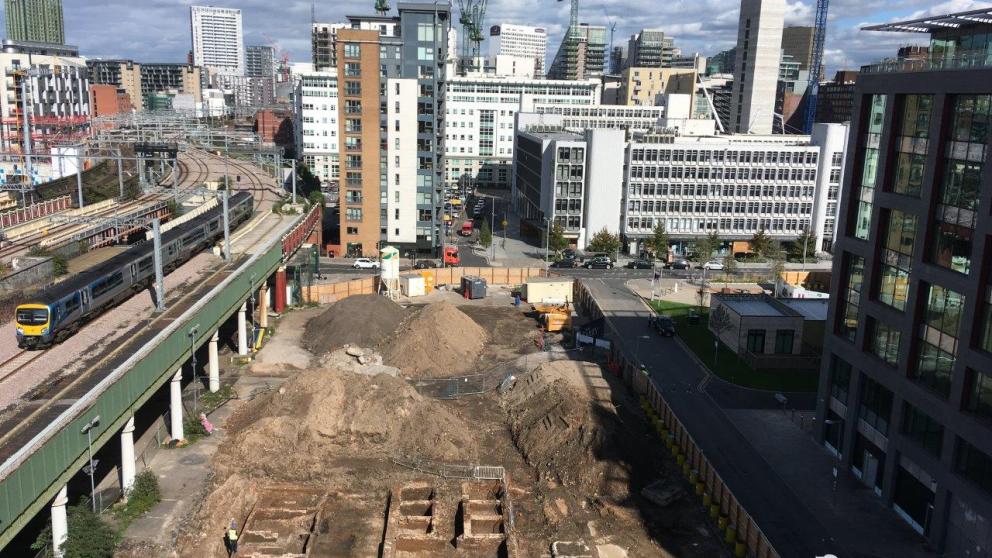University of Salford partner in international research to shape future of zero waste construction

Morgan Sindall Construction, BIMBox, University of Salford, University of Manchester and Arcas & Callisto Consulting have been unveiled as key partners in an international, multi-disciplinary consortium that is undertaking a watershed research project into how to increase sustainability in waste management across the built environment.
The landmark four-year study, known as RECONMATIC, will explore automated solutions for sustainable construction and demolition waste (CDW) management. The UK partners will harness innovation through digital construction and building information modelling (BIM) to develop methods that will help to better identify and minimise waste during the entire lifecycle of a building.
The project, funded by UK Research and Innovation (UKRI) and Horizon Europe – the EU’s key R&D funding programme - will see the creation of solutions that will be easily adoptable by all stakeholders involved in the processes of CDW, in order to reach the expected future EU target of high CDW recovery (to be set in 2024 or beyond) and most importantly the status of zero CDW by 2050.
Throughout the study, Morgan Sindall’s outlook will be informed by its Intelligent Solutions approach, which sees digital and platform design capabilities combined with modern construction methods and innovative carbon reduction tools to create unique, sustainable, and inspiring places for its customers.
Huge amounts of CDW data have already been gathered by Morgan Sindall for materials such as concrete, steel and plasterboard – some of the major contributors of embodied carbon in construction.
Working closely with the University of Salford, this data will be used to valorise waste and map out optimised waste streams for construction materials - with the ambition of realising a true circular economy.
To support the sharing of waste-related information within a digital context, Morgan Sindall and BIMBox will be leading the development of a new dataset, known as WASTEie, to simplify information exchange, data assignment and classification, both at projects and between organisations.
The dataset, built on the foundations of open formats including IFC schema - a storage system for organisIng and transferring digital data - will seek to standardise waste information and encompass new attributes to support BIM models as circular economy tools.
This will be a pivotal innovation, as a standardised information dataset for waste related aspects does not currently exist. Once live, it is intended to provide clearer routes for collaboration which estates teams, contractors and designers alike can use to take advantage of BIM and digital construction processes to proactively reduce waste.
In tandem, Morgan Sindall’s Materials Data Bank (MDB) will be interlinked to and from WASTEie, ensuring the latest manufacturer and product data is shared and stored.
Alongside this, the team will employ generative design tools to establish AI-driven optimisation initiatives, such as waste predictor tools. These will interlink with the MDB and WASTEie dataset to ensure the same data and language is used throughout and can support new and existing developments.
The predictor tools will establish new, more accurate benchmark targets throughout a project’s lifecycle. This will help clients, developers, consultants and contractors to make more informed choices to design out waste from the outset. The MDB will map out current waste streams and influence future waste streams for the majority of materials used on both new build and refurbishment schemes within Construction and Infrastructure.
Learnings from across the research period will be incorporated to enable the widest application possible throughout construction and infrastructure projects, plus potentially for use in external industries.
The process of converting different formats of construction information to digital twins will be automated, as will the decision-making system for repurposing, deconstruction and demolition. The project will employ cutting edge automated AI-assisted CDW classification and robotic segregation off-site in order to achieve its ambitious goals.
Morgan Sindall will work with 23 Reconmatic partners based in seven countries to develop these digital tools.
Barry Roberts, North West managing director of Morgan Sindall Construction, said: “This composition of our consortium will enable the project to tackle the whole life cycle of waste management, propose beyond-state-of-the-art technologies, and contribute to reaching the zero-waste construction industry in Europe that we all desire. Throughout RECONMATIC, we want to engage with industry stakeholders and policymakers to encourage the widespread adoption of the innovations we will deliver. This is a really exciting initiative and comes at a time when the development of net zero solutions has never been more important.”
Juan Ferriz-Papi, Lecturer in Building Surveying at the University of Salford, said: “Change is difficult to promote in the construction industry but the new challenges to achieve net zero targets means we need to introduce automation technologies to improve performance, quality and sustainability in our buildings. This project looks in detail at the different stages of the construction asset life cycle. Data management and stakeholder collaboration are the main focus on RECONMATIC, where the University of Salford is contributing from the Built Environment and Robotics departments.”
The RECONMATIC project is funded by the European Union under Grant Agreement No. 101058580 and by the UK Research and Innovation as part of the UK Guarantee programme for UK Horizon Europe participation.
To find out more about Reconmatic, head to Contact | RECONMATIC.
For all press office enquiries please email communications@salford.ac.uk.
Share:
